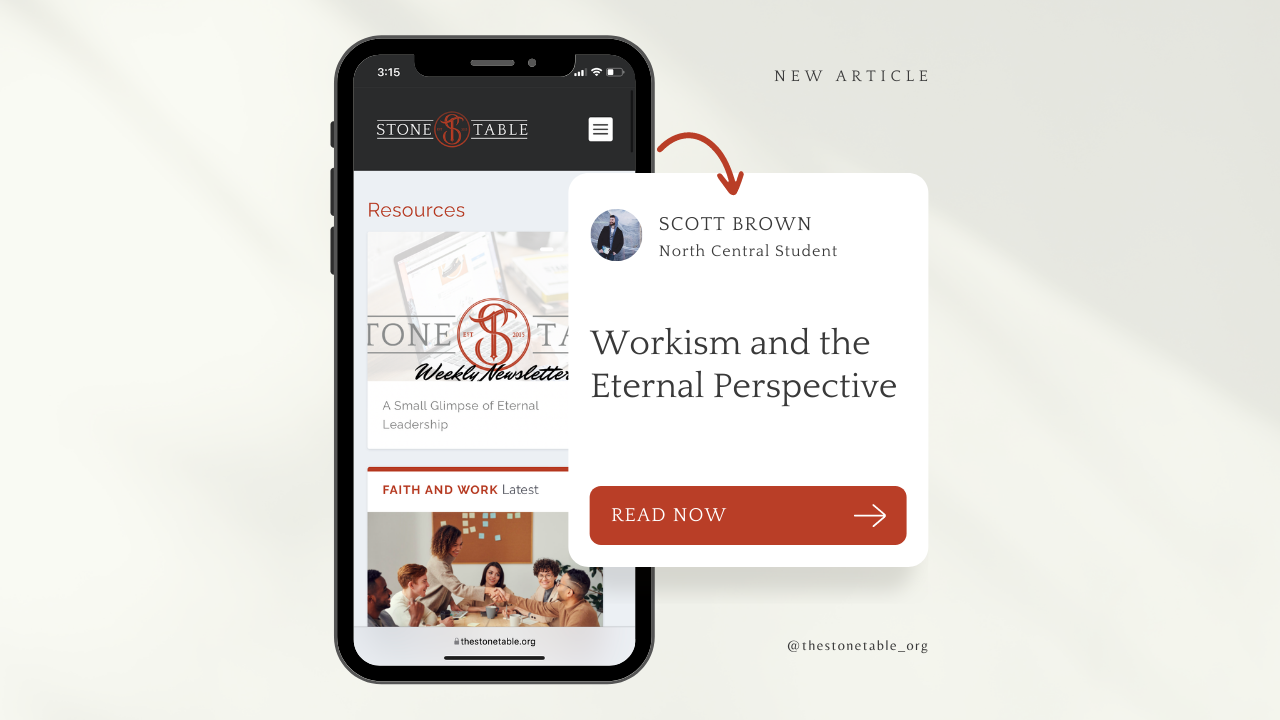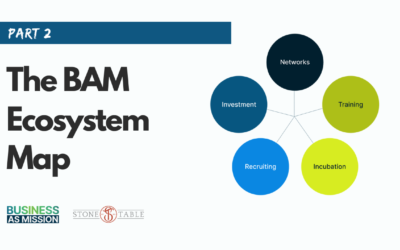Workism and the Eternal Perspective

Many times throughout the Gospel, Jesus presents to us the challenge & encouragement to keep our eyes on the things that matter – the things that will last for eternity. Paul also continues this teaching throughout the epistles in the New Testament, keeping himself & the churches rooted in the expectation of Christ’s return.
When it comes to work, often we can be shortsighted. We can lose our focus on the things that are really important, the eternal things, for the temporary worries or comforts of our day.
Workism is one tunnel that people often fall into when it comes to this loss of perspective.
Workism and a Kingdom Principle
I think it’s always important to first note that work is important. It is not irrelevant, wasteful, or worthless – it has purpose, meaning, and it has been given a role in God’s kingdom. However, when we misappropriate that meaning and ascribe it to work itself, rather than to God, we find ourselves in the workism mentality. This is where we practice worshipping our work, rather than worshipping through our work.
There is a phenomenal kingdom principle that relates to the eternal perspective, but it also resonates with our daily basis applications, and I think it bears some relevancy to the challenge of the workism mentality.
Matthew 6:33-34, one of my favorite passages in that Gospel, reads,
“But seek first the kingdom of God and his righteousness, and all these things will be added to you. Therefore do not be anxious about tomorrow, for tomorrow will be anxious for itself. Sufficient for the day is its own trouble.” (ESV).
What I like about this passage is that it relates to the importance of keeping our minds set on what matters – the kingdom of God and His righteousness. While this verse sets us in the right direction, we are reminded because of that (“therefore”), we are to not worry about tomorrow and instead focus only on today. Kind of an interesting juxtaposition, but it makes sense when you think about it. Right? Yeah.
Workism is something that results from a perspective shift – from taking our eyes off of what really matters and letting ourselves be caught up in our circumstances. Workism is one form of idolatry that can result from a desperate attempt to catch control of one’s life when there is a feeling of powerlessness.
Often, powerlessness is simply a result of not allowing God’s faithfulness to be present or active in our lives, or simply not trusting first that “He is” (Hebrews 11:6). Our faith, when applied into Christ, results in some miraculous things. It is because of Who we trust that this works, not simply because faith itself is powerful. It matters what we put our faith in.
Workism is one facet of a broken faith system. It’s caused by us putting our faith in the wrong place – our work. This is easily recognizable once it’s gotten out of control, but the onset is more challenging to pick up.
Putting our faith in a temporary fix-it system, think: “more money, less problems”, will cause us to derail the train that God has put together for us. We have a pre-organized path where the Lord orders our steps (Ephesians 2:10, Psalm 37:23), but when we take our faith out of Him and put our eyes on the waves, we can easily fall into an idolatrous spiral of destitution – including workism.
Really, workism is an easy out. It’s simple. All it takes is all we have – time, energy, purpose, identity, soul, and heart. It’s simple, though – put work in, get results out – just like a vending machine.
All it takes is our heartfelt dedication to an empty idol and we can find identity in our work! Yeah! However, the cost is rather steep. Forcing our faith into something that we can manipulate was never the way God intended life to be, so when we put something out of order into the “machine” that He’s created, often we can end up with a serious malfunction. It’s like sticking a piece of candy in a vending machine and expecting to get the quarters out. It doesn’t work that way.
What can we do, then, to prevent ourselves from taking this desperate leap into a workism mentality and seeking after our paycheck more than our Padre?
Eternal perspective. Eyes on Jesus, baby.
Workism and the Finality of Christ
There is one thing that is established in the heavens – that is God’s reign & rule. What He says goes, what He decrees is established, and what He determines will come to pass. That’s simple math.
Yet, we can get so mixed up when we find ourselves trying to hold on to an eternal perspective while facing our everyday work and life stress. How do I keep my eyes on Jesus when my bank account is draining, and my kids are screaming at me? Great question.
Paul often encouraged his churches to remain consistent in their hope for a soon-coming King – the Lord Jesus – returning on the clouds. This was a frequent encouragement in times of despair. However, how can we respond with similar attitudes when we’re not facing persecution, just general life stress or a battle with workism?
I think what Paul writes in Philippians 4:6-9 is of the utmost importance when it comes to setting our minds on Christ, even in the daily battles. Paul writes in verse 8,
“Finally, brothers, whatever is true, whatever is honorable, whatever is just, whatever is pure, whatever is lovely, whatever is commendable, if there is any excellence, if there is anything worthy of praise, think about these things.” (ESV).
Paul isn’t relegating our mental & emotional health to chance, not even to faith! He’s saying “think! Think about these things!”, and that’s an active imperative right there. That means do it.
Workism can be a result of a strained, stretched, and tired mind sometimes. It’s a slip that causes us to continue to slip, but that slipping must be either voluntarily stopped or voluntarily allowed. And that’s up to us.
While there is no Greek word for “workism”, Paul does remind us that this perspective requires action. The Greek word he uses for “think [on this]” is logizomai, meaning in this context “to meditate on a thing with a view to obtaining it”. That requires choice, even action.
Workism is an easy one to fall into. If we allow our minds to slip from the things that are most important, like our trust in Christ as fulfillment & provider, we are prone to lose sight of why it’s important to do so. Work was meant to be done with joy, but workism often takes that joy and establishes pressure in its place. This is not a Christian ethic.
Paul exhorts us again in Colossians 3:2, “Set your minds on things that are above, not on things that are on earth.” He sure talks a lot about our mindset, doesn’t he?
Setting our minds on things above does not mean neglecting our present circumstances, but it does mean remembering what is most important, even amid trials. Workism may rob our joy and promise identity, but Christ promises peace & joy when we recognize our identity is in Him.
Today, let our Father be provider again. Let our hearts return to an open hand, allowing the presence & power of the Holy Spirit to minister to us in the spaces we need healing. Let workism out, and let Jesus in.






